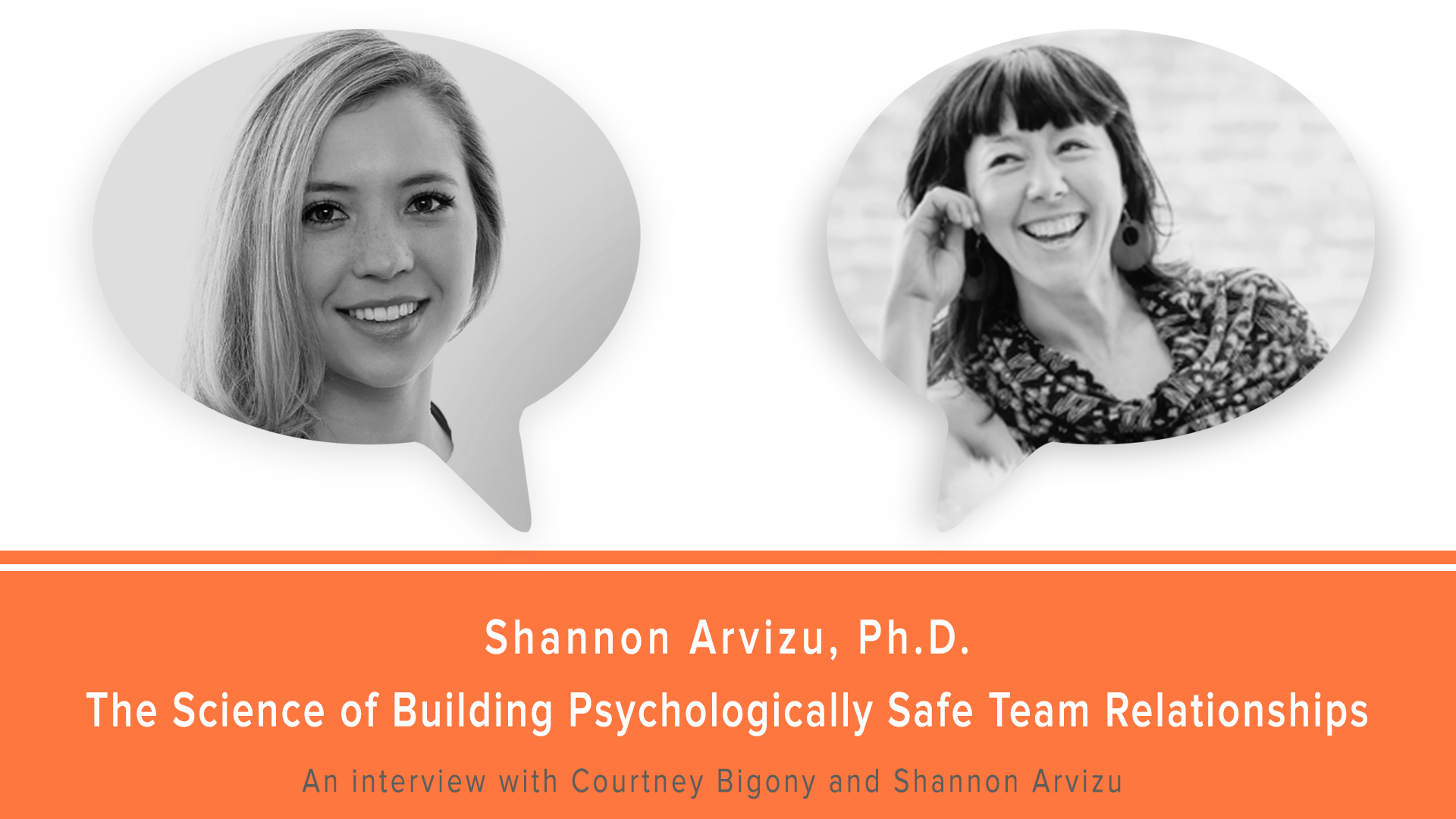Shannon Arvizu, Ph.D: The Science Of Building Psychologically Safe Team Relationships
Welcome back to Talk Nerdy To Me, 15Five’s academic blog series where we get nerdy, talk to the world’s best thinkers, and break down the latest academic research that you can apply to your workplace. This time around, I spoke with Dr. Shannon Arvizu on the topic of professional relationships.
Shannon is a tech sociologist and founder of Epic Teams where she applies her unique background in behavioral science, positive psychology and team performance to help Fortune 500 companies and startups develop high performing managers and teams. Shannon has taught extensively at Columbia University, where she received her Ph.D. in sociology with an emphasis in technology, organizations, and social movements.
In this episode, Dr. Shannon Arvizu gives a deeper focus into the importance of cultivating strong relationships amongst team members. Learning to thrive can seem like a nearly impossible goal for some, especially for those who find it stressful to work closely with colleagues or don’t have a great rapport with their manager. This environment certainly doesn’t allow a person to show up day-to-day as their best selves. The relationships we have, good or bad, can influence the quality of our everyday lives, and professional relationships aren’t exempt.
Making the shift into a more enjoyable and productive workspace requires a collective effort from your team members. This can include having more transparency within the team, honest conversations, and giving open feedback during 1-on-1s. The new mentality of modern work culture looks to leadership to encourage psychological safety, and in this interview you’ll receive tips from Dr. Arvizu for how to foster an environment that allows your employees to become their best selves.
Interview Highlights include:
• Tips and tricks to increase psychological safety at work
• Strategies to foster high-quality professional connections
• How to strengthen professional relationships through microstructures
This conversation has been edited and condensed. To listen to the full conversation, click the video below.
Courtney: Tell me about your background and work at Epic Teams.
Shannon: As a sociologist, I study relationships and groups. Humans are social creatures both at home and at work. If we don’t feel safe to work together, if we don’t feel like we can be heard or seen, and if we don’t feel like what we say matters, performance will suffer. At Epic Teams, we work directly with leaders and managers, many of whom are leading for the first time, to give them tools and techniques to accelerate their ability to work together, which in turn impacts performance.
Courtney: Since we’re talking about relationships – let’s start with Esther Perel (psychotherapist, New York Times Best Selling author and TED talker), who just spoke on this exact topic at South By Southwest. Esther is a psychotherapist who primarily works with couples, but now she is consulting with companies on how to improve professional relationships. She says “the quality of our relationships determines the quality of our lives… it’s equally so, that the quality of our relationships at work determines the actual quality of our work and our overall ability to succeed. Today, relationships have become the new bottom line.”
Obviously, this is a really important topic in the world of work today. Can you share more about the science behind effective relationships at work?
Shannon: I draw primarily from Amy Edmondson’s work on psychological safety and the importance of reducing learning anxiety. Often times employees need to do things they have never done before or work with new people and are under tight deadlines. It’s important that people feel safe to experiment and try something new. People also need to feel like it’s safe to make mistakes and fail. I draw from this research to help people understand why it’s so important to develop the relationship first.
Courtney: Psychological safety is the foundation of strong professional relationships and is defined as the belief that your environment is safe for interpersonal risk taking. Key indicators include a climate where people feel safe to speak up. People will ask for employee feedback, give candid feedback themselves, ask questions, openly admit mistakes, share information and express ideas and concerns. The impact? Increased learning, performance, engagement, and employee satisfaction. University of Michigan professor, Jane Dutton, and her colleagues show that peer support and relationships are critical for psychological safety.
Unfortunately relationships are sometimes seen as soft skills that Esther says, “people love to idealize but disregard in reality.” What’s one step leaders can take to make strong relationships a reality?
Shannon: Self awareness is a great starting point. First we help managers understand both their own strengths and sabotaging tendencies. Then it’s important to increase awareness at the team level. For strengths discovery, I recommend strengths assessments including Gallup Strengths Finder or VIA Character Strengths. Some people are more relational, whereas some tend to focus more on execution. It’s helpful to have this baseline assessment to see where you and your team is the strongest.
Next, managers should understand the sabotaging tendencies of their team. Sabotaging tendencies are automatic, unproductive mental habits, and everyone has them. They are limiting beliefs and assumptions that impact how we handle challenges and they result in lots of stress and negative emotions.
To help teams identify their saboteurs, I recommend Stanford lecturer, Shirzad Chamine’s New York Times bestselling book, Positive Intelligence and his free online assessment. There are multiple sabotaging tendencies, including the pleaser (someone who overextends themselves to others are becomes resultful as a result), and the hyper-achiever (someone who is dependent on performance and achievement for self validation) to name a few. The Hyper-achiever is the most common tendency I see in the start-up tech community.
In sum, a great starting point for psychologically safe team relationships is to develop an awareness of your strengths and saboteurs – both as leaders and as a team. Do this at the beginning of every working relationship.
Courtney: What are other techniques that managers can use to increase emotional intelligence, vulnerability, authenticity, connection, belonging, trust, and empathy?
Shannon: Other techniques include discovery questions, feedforward techniques, global listening, and positive communication.
Discovery questions are a core coaching technique and critical for strong relationships. Discovery questions are more open – whereas directive questions and are more closed. For example, discovery questions sound like “tell me how you’re thinking of this?” whereas directive questions sound like “why did you do it that way?” Research shows that in high performing organizations, leaders ask just as many questions as they provide answers. Do your managers ask questions and seek others viewpoints or only state their position?
Feedforward is an alternative approach to feedback that focuses on the future instead of the past. Feedforward expands possibilities, rather than points out problems. Instead of saying, “that idea won’t work because…” say “what if we added this…?”
Global listening is a practice that helps managers listen beyond words that are spoken. It takes into account the emotions behind the words, the body gestures, and tone. In other words, the form of a conversation is just as important as the actual content. Academics call this relational energy, or how interactions affect emotions, and higher relational energy leads to better employee engagement and job performance.
Positive feedback is also critical for strong relationships. Research shows high performing teams have more positive feedback (supportive and encouraging communication) than negative feedback. Positive feedback is important for strong relationships because they act as emotional credits. As a leader you may say something the wrong way or maybe you didn’t invite someone to the meeting that should have been there. One word or one phrase can shut down psychological safety. If you don’t have enough emotional credits, or enough positive interactions with people to be able to cushion the blow, people shut down.
Courtney: You also mentioned the importance of structures. Tell us more about how why we can’t just rely on relationships and why we need structures.
Shannon: There are two systems to a team, 1 the relational system, which is composed on emotions, the relationships, the memories and ways of relating, and 2 the technical system, which is about procedures, tools, and how the work is structured. It’s about joint optimization of both the social system and the technical system.
We look at what are the workflows, where are the most blockers? Where are the bottlenecks? How can you adjust the structure to increase performance? Having structured ways for people to diverge and converge in a way that feels participatory and collaborative is also really key.
The information shared by Dr. Arvizu includes evidence-based techniques that have boosted performance in many companies where leaders have focused on relationship building, instead of trying to drive performance at any cost.
Leaders can create environments that are psychologically safe, focus on employee strengths, create awareness around unproductive mental habits, and value employee feedback by asking the right questions on a regular basis. By joining together the relational and the technical to increase performance and professional relationships, businesses can facilitate a healthy and sustainable culture alongside a high performing one.

Courtney Bigony is Director of People Science at 15Five, continuous performance management software that includes weekly check-ins, objectives (OKR) tracking, peer recognition, 1-on-1s, and 360 reviews. She is also the founder of The Deep Feedback Movement, where she provides actionable insights for People Teams based on the latest social science research, and a Fellow at the Center for Evidence Based Management.




